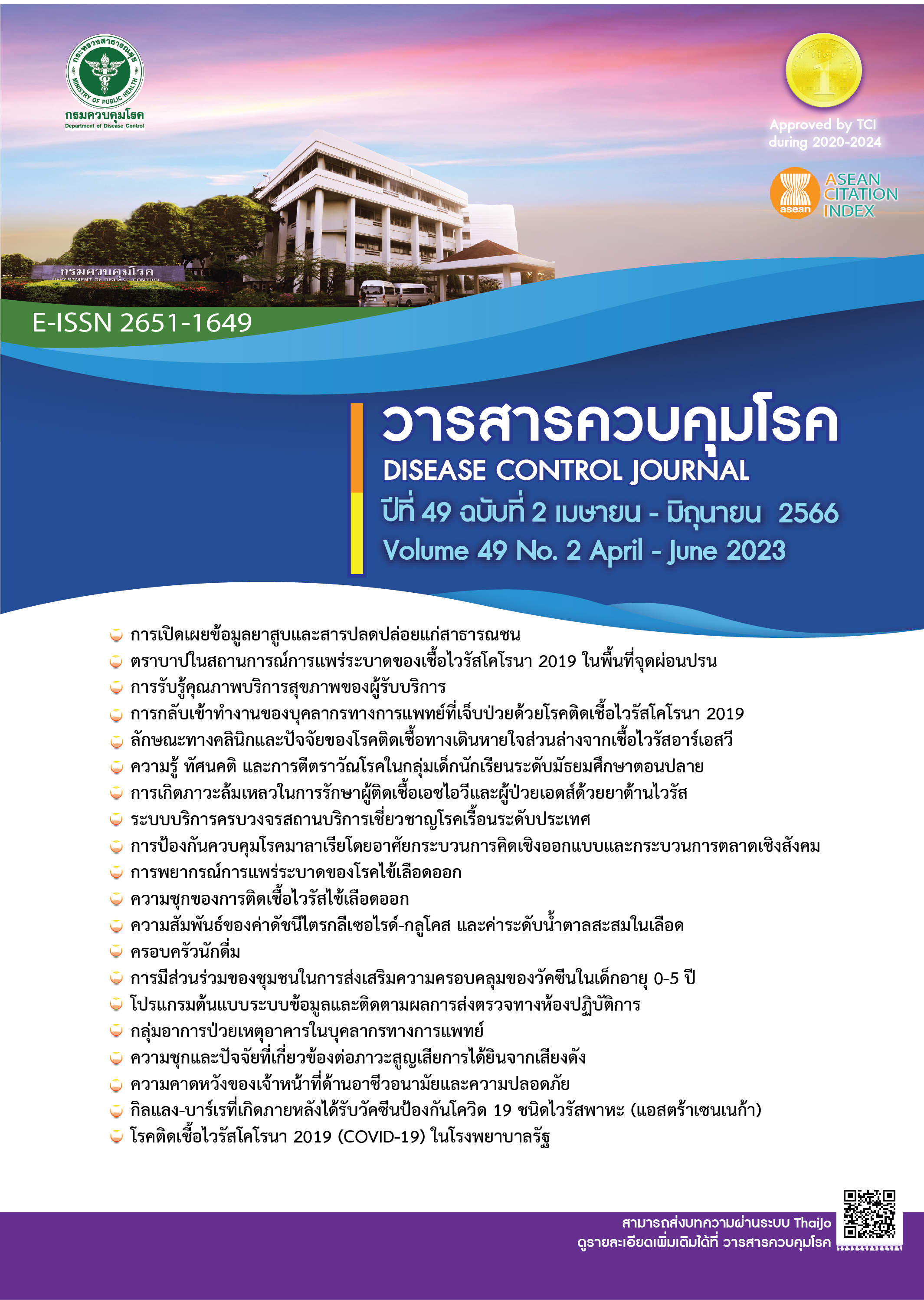Stigma during the Coronavirus Disease 2019 (COVID-19) Pandemic of checkpoint for border trade, Mae Hong Son Province
DOI:
https://doi.org/10.14456/dcj.2023.22Keywords:
stigma, mental health, Coronavirus Disease 2019, border, Mae Hong Son ProvinceAbstract
This article aims to review the current literature on social stigma in the Coronavirus Disease 2019 (COVID-19) pandemic and to examine situation and strategies to reduce the stigma, at the first-time report of onset COVID-19 patient at the checkpoint for border trade of Mae Hong Son Province. The narrative reviews on stigma and the participation observation were conducted. Thematic analysis was used to draw a conclusion from the stigma situation, and strategies that used to reduce social stigma, and then compose a review article in Thai. The results show that strategies to reduce social stigma was divided into 2 levels as follows: 1) structure level which was a building of supportive social network and cooperation in all sectors, and 2) interpersonal level which provided good practices as new normal life and adjusted personal attitude of people in the community. Therefore, the knowledge of stigma in COVID-19 pandemic were from the combination of previous knowledge from international outbreaks of emerging and re-emerging diseases that occurred in the past. The findings about reducing of social stigma in this article should be used as guideline to prevent and reduce the stigma effect in the other border areas of Thailand, and applied to the outbreak of other emerging diseases for the future.
Downloads
References
Ministry of Interior (TH). Discussion on obtaining permission to leave the Kingdom of Thai nationals through the checkpoint for border trade. Bangkok: Office of the Permanent Secretary; 2016. (in Thai)
Caddell J. What Is Stigma? [Internet]. [cited 2020 Feb 19]. Available from: https://www.verywellmind.com/mental-illness-and-stigma-2337677
United Nations Network on Migration. Forced Returns of Migrants must be suspended in times of COVID-19. United Nations 2020 [Internet]. [cited 2020 Nov 14]. Available from: https://www.iom.int/news/forced-returns-migrants-must-be-suspended-times-covid-19
IOM-UNHCR-UNODC. Joint statement by UNHCR, IOM and UNODC on protection at sea in the Bay of Bengal and Andaman Sea. UNHCR, IOM and UNODC 2020 [Internet]. [cited 2020 Feb 18]. Available from: https://www.unhcr.org/news/press/2020/5/ 5eb15b804/joint-statement-unhcr-iom-unodc-protection-sea-bay-bengal-andaman-sea.html
Craiga GM, Daftary A, Engel N, O’Driscoll S, Loannakia A. Tuberculosis stigma as a social determinant of health: a systematic mapping review of research in low incidence countries. IJID. 2017;56:90-100.
Department of Mental Health (TH). Department of Mental Health reiterates stigma, an important obstacle in suicide prevention [Internet]. [cited 2022 Jan 11]. Available from: https://th.rajanukul.go.th/_admin/file-download/review000 3152.pdf (in Thai)
World Health Organization. Stigma and discrimination. Geneva: World Health Organization [Internet]. [cited 2021 Nov 12]. Available from: https://www.euro.who.int/en/health-topics/noncommunicable-diseases/mental-health/priority-areas/stigma-and-discrimination
Brohan E, Slade M, Clement S, Thornicroft G. Experiences of mental illness stigma, prejudice and discrimination: a review of measures. BMC Health Serv Res. 2010;10:80.
Goffman E. Stigma. In: Key ideas in sociology. Slattery M, editors. Cheltenham: Nelson Thrones; 2003. p. 185-8.
Corrigan PW, Rao D. On the Self-Stigma of Mental Illness: Stages, Disclosure, and Strategies for Change. Can J Psychiatry. 2012;57(8):464-9.
Grappone G. Overcoming Stigma [Internet]. [cited 2021 Sep 14]. Available from: https://www.nami.org/Blogs/NAMI-Blog/October-2018/Overcoming-Stigma
World Health Organization. Social Stigma associated with COVID-19. Geneva: World Health Organization [Internet]. [cited 2022 Jan 8]. Available from: https://www.who.int/docs/default-source/coronaviruse/covid19-stigma-guide.pdf
Bachelet M, Grandi F. The coronavirus outbreak is a test of our systems, values and humanity [Internet]. [cited 2020 May 20]. Available from: https://www.unhcr.org/news/latest/2020/ 3/5e69eea54/coronavirus-outbreak-test-systems-values-humanity.html
United Nation. United Nations Guidance Note on Addressing and Countering COVID-19 related Hate Speech. United Nation [Internet]. [cited 2021 Nov 19]. Available from: https://www.un.org/en/genocideprevention/documents/Guidance%20on%20COVID-19%20related%20Hate%20Speech.pdf
Shokri A, Moradi G, Bolbanabad AM, Satary M, Shabrandi M, Sadeghkhani P, et al. Stigma and COVID-19 in Iran: a rapid assessment. Int J Hum Rights Healthc 2021;14(1):4-9.
Thanirat S, Radabutr M, Wichianrat S, Opasawatchai S. Strategies to Relieve a Social Stigma on COVID-19. Kuakarun Journal of Nursing 2020;27(2):164-73. (in Thai)
Hatzenbuehler ML, Phelan JC, Link BG. Stigma as a fundamental cause of population health inequalities. Am J Public Health 2013;103:813-21.
Corrigan PW, Watson AC, Barr L. The self-stigma of mental illness: implications for self-esteem and self-efficacy. J Soc Clin Psychol 2006;25(8):875-84.
Cook JE, Purdie-Vaughns V, Meyer IH, Busch J. Intervening within and across levels: a multilevel approach to stigma and public health. Social Science & Medicine 2014;103:101-9.
Earnshaw VA, Quinn DM. Influenza Stigma during the 2009 H1N1 Pandemic. J Appl Soc Pshchol 2013;1:43. doi:10.1111/jasp.12049.
Ministry of Public Health (TH). Responding Guideline to the COVID-19 Pandemic in Emergencies situation (No.1) [Internet]. [cited 2022 Jan 11]. Available from: https://ddc.moph.go.th/viralpneumonia/file/g_other/g_other02.pdf (in Thai)
Razu SA, Nishu NA, Rabbi F, Talukder A, Ward PR. Knowledge, Attitudes, and Practices Concerning COVID-19 in Bangladesh: A Qualitative Study of Patients With Chronic Illnesses. Front. Public Health 2021;9:1-8. doi:10.3389/fpubh.2021.628623.
Downloads
Published
How to Cite
Issue
Section
License
Copyright (c) 2023 Disease Control Journal

This work is licensed under a Creative Commons Attribution-NonCommercial-NoDerivatives 4.0 International License.
Articles published in the Disease Control Journal are considered as academic work, research or analysis of the personal opinion of the authors, not the opinion of the Thailand Department of Disease Control or editorial team. The authors must be responsible for their articles.






